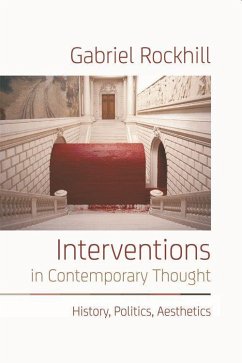'These timely interventions challenge us to rethink the role and influence of scholarly discourse and critique. Gabriel Rockhill has developed a highly original, "conjunctural" approach, which consists in reading the works of the French cultural critics and philosophers that are at the core of his expertise, according to a judgment of relevance and urgency that is part of our own historicity as critics and academics. These sharp readings of Badiou, Derrida, Foucault and Badiou are therefore part of a welcome call to arms to revitalise and politicise Anglo-American cultural scholarship.' Giuseppina Mecchia, University of Pittsburgh A critical intervention in contemporary theoretical debates on history, politics and aesthetics With the aim of rethinking the state and stakes of contemporary theory, Gabriel Rockhill critically works through some of the most important recent philosophical writings on the intertwined topics of history, politics and art. He offers guidance to some of the complex debates in these areas, as well as a commanding overview of the key issues and some of the central figures, including Foucault, Derrida, Castoriadis, Badiou and Rancière. By resituating theoretical work in a broader force field of culture and power, he advances an innovative and nuanced description of recent intellectual developments that calls into question the now standard but rather stereotypical accounts of prominent thinkers and philosophical movements. Far from hiding behind the towering figures with whom he engages, Rockhill stakes out positions in relationship to them and formulates precise arguments in favour of a novel understanding of the historical relationship between art and politics, arguing that there is a need for a deep shift in the tectonic plates that undergird these debates. The result is an invitation not only to retool extant methodological paradigms but also ultimately to reinvent the practice of theory itself. Gabriel Rockhill, the author of Radical History & the Politics of Art (2014) and Logique de l'histoire (2010), is Associate Professor of Philosophy at Villanova University and the Founding Director of the Atelier de Théorie Critique at the Sorbonne in Paris, France. Cover image: Anish Kapoor, Svayambh, 2007 (c) 2016 Anish Kapoor / ARS, New York / DACS, London Cover design: [EUP logo] edinburghuniversitypress.com ISBN 978-1-4744-0535-5 Barcode
Hinweis: Dieser Artikel kann nur an eine deutsche Lieferadresse ausgeliefert werden.
Hinweis: Dieser Artikel kann nur an eine deutsche Lieferadresse ausgeliefert werden.








